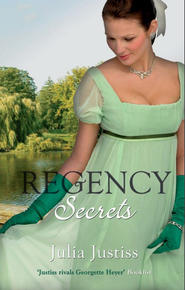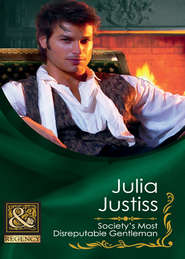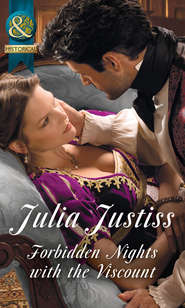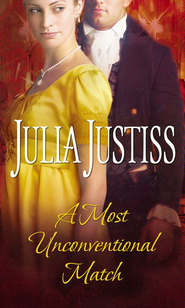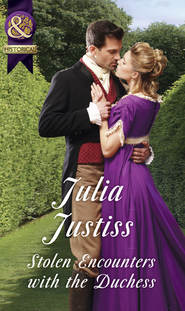По всем вопросам обращайтесь на: info@litportal.ru
(©) 2003-2025.
✖
From Waif To Gentleman's Wife
Настройки чтения
Размер шрифта
Высота строк
Поля
Though he’d heard of the unrest and Nicky had specifically mentioned it, Ned had never truly expected to encounter any difficulties. Indignation over the unprovoked attack and the injury to his valet prompted him to proceed directly, as John Coachman advised, to the local magistrate. But was that the wisest course of action?
His agreement with Nicky was so recent that no one at Blenhem Hill or the surrounding area knew he’d acquired the property. He was neither expected, nor would anyone recognise him when he arrived. Indeed, even Nicky’s former manager didn’t know about him, for he carried Nicky’s note of introduction to Mr Martin in his pocket.
During their discussions he had focused on the agricultural problems at Blenhem. With the shock of the attack to prompt his memory, he now recalled that Nicky also owned a controlling interest in one of the local cotton mills.
Had the Englemere crest been recognised when they stopped at the inn in Kirkwell? It seemed rather a stretch of coincidence to presume the attack on a carriage belonging to the nobleman known to own both the cotton mill at Dutchfield and the estate at Blenhem Hill, occurring on the seldom-travelled road leading to that property, could be just the random act of local hooligans. Especially given the slogans being shouted by the perpetrators.
Last summer, a renewed series of Luddite uprisings had swept through East Anglia. The mob had smashed frames in a mill at Loughborough and though this time none of the proprietors had been killed, Ned vividly recalled that two owners had been murdered in a previous wave of violence.
Even if the attack hadn’t targeted Nicky personally, the fact that such a move had been made against a crested coach indicated that, at a minimum, a strong sense of disaffection prevailed in the area. If the people around Blenhem Hill were suffering and desperate, as Martin had indicated, the attackers might well be local men. Having Ned ride in demanding justice of the magistrate and threatening transportation to the perpetrators—perhaps sons and husbands, brothers and sweethearts of his own tenants—would hardly gain him the confidence and co-operation he needed to restore prosperity to Blenhem.
Or discover the true purpose behind the attack.
A course of action occurred to him, expeditious if unprecedented. Mr Martin and the staff at Blenhem Hill were not expecting Sir Edward Austin Greaves; however, they would be anticipating the arrival of a new estate agent.
Though an agent might be the younger son of gentry, as a working man rather than an owner there was less of a difference in station between him and the tenants on his estate. Such a man would be more likely to inspire trust and elicit candid opinions about Blenhem—and any agitation in the neighbourhood—than an unknown new owner of aristocratic birth. No matter how sympathetic or friendly a face Ned presented to them, simple ‘Mr Greaves’ would probably be able to learn a good deal more about these people and their circumstances than the more elevated ‘Sir Edward’.
He would do it, he decided. An estate agent having little need for a valet, he’d send Harrison home to Kent to recover and John Coachman and the groom back to Nicky with a report of what had happened.
The decision made, an ironic amusement tempered his anger and frustration. This ‘challenge’ was turning out to be even more interesting than he’d anticipated.
An hour later, the carriage turned down the gravelled drive leading to the front door of Blenhem Hill. Or at least, what had once been a gravelled drive, now mostly given over to the weeds that flourished between the wagon tracks.
Mr Martin had not underestimated the dire condition of the property. Indeed, there was so much wrong that Ned hardly knew where to begin. With every neglected field and tumbledown dwelling they had passed, Ned’s ire had increased.
No wonder the local citizenry were restive! If he were a tenant on one of those farms, he’d be ready to don a mask and shoot someone himself. Nicky shouldn’t have simply fired his previous manager, Ned concluded, struggling to control his outrage, he should have had him flogged on the village green.
His angry gaze swept over the manor house as they approached, then checked in surprise. Unlike the vistas he’d just passed—bracken-filled fields and dilapidated cottages roofed in mouldering thatch, many of which seemed in imminent danger of collapsing altogether—this dwelling seemed to be in good repair.
The coach pulled up with a squeal of brakes and a jingle of harness. Ned hopped out—but no one emerged from the manor to greet the new arrivals. Not until he had raised his fisted hand to knock at the broad hickory-planked door did it swing open.
An older man he presumed to be the butler stood upon the threshold. After glancing at the carriage, its crest visible on the undamaged door nearest them, the man bowed. ‘How may I help you, my lord?’
With a warning glance to his servants, who had only reluctantly agreed to the plan their employer had outlined to them before resuming their travels, Ned extended his hand. ‘Myles, isn’t it? Lord Englemere sent me. I’m Ned Greaves, the new estate manager.’
An hour later as he walked through the deepening dusk from the manor to the stables to confer with Harrison and John Coachman, Ned noted the first benefit that had derived from his altered status. Sir Edward must have summoned the men to the estate office, perhaps causing speculation and risking the possibility that they might be overheard by eavesdropping servants. Mr Greaves could simply go to their quarters. There was a curious and rather liberating freedom in ambling across the stableyard almost unnoticed, he reflected.
Not a flicker of surprise had crossed Myles’s face when Ned had informed the butler he needed to consult with Lord Englemere’s grooms and coachman on the repair of his vehicle, the damage to which and the wounding of Harrison he’d fobbed off as an accident with the coachman’s pistol that had occurred on the road.
Of course, the butler’s demeanour had been wooden since his arrival. It was impossible to discern whether this senior member of the household sympathised with or detested the man who had previously held the position Ned had assumed, whether he welcomed or resented the arrival of a replacement.
In the same polite but impersonal tone with which he’d answered the door, Myles had asked Ned if he wished his baggage to be stowed in the largest guest chamber, where the previous agent had been installed. Upon Ned’s assent, he directed a footman to fetch Ned’s things, informed him of the hours when the household normally breakfasted and dined, and bowed himself out.
Myles was a sapling he’d have to water carefully and diligently cultivate if he was going to find out what he needed about the previous direction of the estate, Ned mused.
He found John Coachman, Richard and Harrison in the loft above the tack room where they’d been given accommodations for the night. The two horsemen were chatting while Harrison, an affronted expression on his face, picked a piece of straw from his coat with his good hand.
‘How does the arm?’ Ned asked, pitching his voice low.
‘Richard fetched water so I’ve washed and dressed it,’ John Coachman replied. ‘Long as he don’t take fever, he should heal quick.’
Ned gave his valet a sympathetic glance. ‘I dare say you’re not sure what is more painful, eh, Harrison? The wrist or being compelled to pose as a groom.’
‘Are you sure you want to continue with this … scheme?’ Harrison replied, pausing, Ned suspected, to swallow an adjective like ‘caper-witted’.
‘It do go against the grain, not reporting the attack,’ the coachman added. ‘An outrage, it is, good Christian folk being attacked in full daylight! Dastardly ruffians ought to be prosecuted.’
‘What would you have me tell the magistrate?’ Ned said. ‘That our coach was accosted by five masked, armed men who shouted slogans, fired their weapons wildly, winging one of our party before fleeing into the woods? We couldn’t even give a good description of the perpetrators.’
‘Recognise the horse, if’n I seen it again,’ Richard spoke up.
‘Even if we identified the horse, we’d have no proof its owner was involved. It wouldn’t be the first time a mount was “borrowed” from his pasture. No, I shall not report the incident. I’ll let the attackers wonder why there was no report. Let them speculate that they intimidated us, or that the magistrate did not deem the incident of sufficient import to investigate. Such conclusions may make them bolder and more likely to do something for which I can lay charges.’
‘Are you sure you want us to leave?’ Richard asked. ‘We could be three more pairs of eyes watching out, Sir—I mean, Mr Greaves,’ he corrected at Ned’s sharp look.
‘No, ‘tis better that you all go, lest one of you slip up and address me with proper honours. I shall discover much more quickly what is going on here if I can mingle among the farmers more or less unnoticed.’
As the three servants exchanged glances over that dubious notion, Ned added, ‘Come now, who would not more easily confide something to a man near his own station? The sooner I uncover what has transpired here, the sooner other good Christian souls can travel the roads in safety.’
That being unanswerable, Harrison said, ‘As you wish, sir, but if you do not leave here with your linen grey and your coats frayed, I shall be much surprised.’
Ned grinned. ‘You think me too high in the instep to care for myself? I’ll have you know I’m quite capable of tying my own cravats, shaving and dressing respectably. And if the laundry maid’s skills are not adequate, I shall engage another one.’
Sobering, he continued, ‘I appreciate your desire to be of assistance, all of you, but you can serve better elsewhere. Lord Englemere must have his coach returned—and repaired—and should be made aware of what has transpired. Harrison should rest and let that arm heal.’
John Coachman nodded. ‘If’n that’s the way you want the game played out, Sir—Mr Greaves—then I reckon we must do it your way.’
Ned nodded. ‘Very good. I shall count on the loyalty and discretion of you all. Harrison, do you think you will feel up to travelling tomorrow? ‘
‘Aye, sir. Reckon I’ll go to my sister in Kent. She’s been after me for a while to come visit. But how long do you expect to remain in this … interesting situation?’
‘I cannot be sure. I’ll send word when I wish to recall you. In the meantime, I’ve a letter for Lord Englemere. See that he gets it immediately upon your return, and all of you, please say nothing about what happened here to anyone else.’
The three men nodded. ‘Best you watch your back, sir,’ Harrison added.
‘I shall,’ Ned said soberly. ‘On my guard as I am, I don’t intend to be surprised by anything else that happens here.’
The following day, Ned went to meet Mr Martin, introducing himself as the replacement estate agent dispatched by Lord Englemere. Greeting him warmly, the old man immediately offered to give Ned a tour of the estate and introduce him to those of the tenants who’d not been driven off by the dwindling price of harvests and the steadily increasing rents.
Ned’s initial good humour diminished with every mile they drove. Fully half the farms were abandoned, the former tenants having left to seek work at the mills in Manchester, Nottingham and Derby. It pained him more than finding gorse in a fine stand of wheat to see so much land lying fallow.
He was more shocked still when Martin led him to the ‘mill’ Nicky had supposedly set up. The empty, roofless two-storey stone building stood silhouetted against the sky in a small clearing near a well, lacking not only a roof, but also doors, window frames, stairs to reach the second floor—and knitting looms.
Worst of all, though, were the thin frames and gaunt faces of the tenants and the tales they related of the greed and abuse of authority practised by Barksdale, Greville Ander’s supervisor.
Making a note of the names, needs and conditions of each tenant family, Ned thanked the workers for their candour and left with promises of seeds for planting, repairs to their dwellings and new and better farm tools. Though from most he received at least a nod of agreement, more telling than all the tales of mismanagement were the blank looks with which most received his promises, mute testaments of their disbelief and hope less ness.
Unlike at his own estates, where visiting a tenant usually ended with them sharing a mug of home-brewed, though none of Blenhem Hill’s people were openly hostile, only one offered him any hospitality. Elderly Dame Cuthbert begged them to honour her by accepting a mug of cider.






